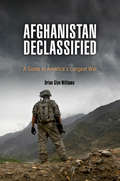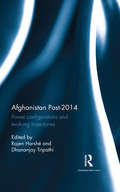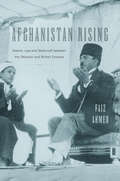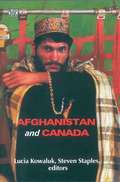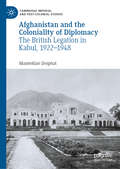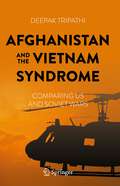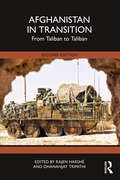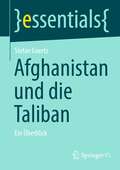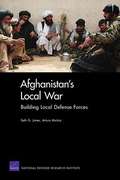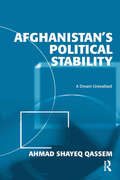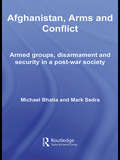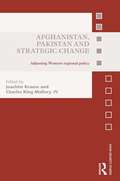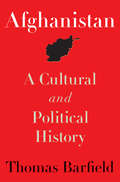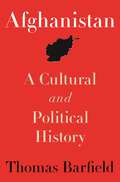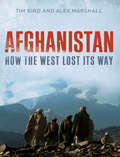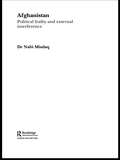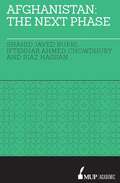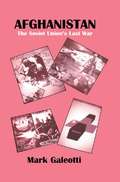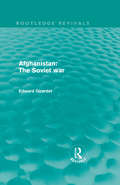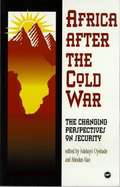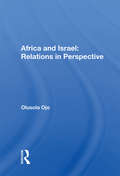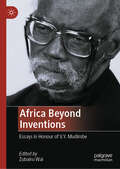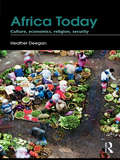- Table View
- List View
Afghanistan Declassified
by Brian Glyn WilliamsNearly 100,000 U.S. soldiers are deployed to Afghanistan, fighting the longest war in the nation's history. But what do Americans know about the land where this conflict is taking place? Many have come to have a grasp of the people, history, and geography of Iraq, but Afghanistan remains a mystery.Originally published by the U.S. Army to provide an overview of the country's terrain, ethnic groups, and history for American troops and now updated and expanded for the general public, Afghanistan Declassified fills in these gaps. Historian Brian Glyn Williams, who has traveled to Afghanistan frequently over the past decade, provides essential background to the war, tracing the rise, fall, and reemergence of the Taliban. Special sections deal with topics such as the CIA's Predator drone campaign in the Pakistani tribal zones, the spread of suicide bombing from Iraq to the Afghan theater of operations, and comparisons between the Soviet and U.S. experiences in Afghanistan.To Williams, a historian of Central Asia, Afghanistan is not merely a theater in the war on terror. It is a primeval, exciting, and beautiful land; not only a place of danger and turmoil but also one of hospitable villagers and stunning landscapes, of great cultural diversity and richness. Williams brings the country to life through his own travel experiences--from living with Northern Alliance Uzbek warlords to working on a major NATO base. National heroes are introduced, Afghanistan's varied ethnic groups are explored, key battles--both ancient and current--are retold, and this land that many see as only a frightening setting for prolonged war emerges in three dimensions.
Afghanistan Post-2014: Power configurations and evolving trajectories
by Rajen Harshé Dhananjay TripathiOwing to its geo-strategic location and mineral wealth, Afghanistan has acquired significance in the inter-state politics of Asia as well as world politics during the past decades. This book outlines Afghanistan's efforts to build a stable and peaceful democratic polity, with external military support from the United States and its NATO allies. It also analyses the nation's development initiatives with major powers such as India, the United States, Russia and Germany. The volume: * brings to the fore ongoing tensions within the Afghan polity and its continued impact on Asian/world politics; * discusses topical themes such as withdrawal of US troops and non-traditional security; and * presents perspectives from scholars and experts from around the world, including Afghans. This work will be useful to scholars and researchers in political science, international relations, sociology, area studies, and the interested general reader.
Afghanistan Rising: Islamic Law and Statecraft between the Ottoman and British Empires
by Faiz AhmedDebunking conventional narratives, Faiz Ahmed presents a vibrant account of the first Muslim-majority country to gain independence, codify its own laws, and ratify a constitution after the fall of the Ottoman Empire. Afghanistan, he shows, attracted thinkers eager to craft a modern state within the interpretive traditions of Islamic law and ethics.
Afghanistan and Canada
by Lucia Kowaluk Steven StaplesThousands of foreign troops have been fighting a seemingly endless war in Afghanistan. Billions of dollars of foreign aid have been poured into the country. Thousands of military and civilian causalities are the tragic human cost. International observers report that corruption is rampant. A new Taliban insurgency is active. In Canada an unprecedented public concern has emerged; a majority of Canadians want to end Canada's currently defined military involvement there.A number of Canada's top political analysts have contributed essays, including Peggy Mason, Linda McQuaig, Michael Neumann, James Laxer, Murray Dobbin, and Michael Byers.Lyle Stewart is a journalist who has worked for the Montreal Gazette and the CBC.
Afghanistan and the Coloniality of Diplomacy: The British Legation in Kabul, 1922–1948 (Cambridge Imperial and Post-Colonial Studies Series)
by Maximilian DrephalThis book offers an institutional history of the British Legation in Kabul, which was established in response to the independence of Afghanistan in 1919. It contextualises this diplomatic mission in the wider remit of Anglo-Afghan relations and diplomacy from the nineteenth to the twenty-first century, examining the networks of family and profession that established the institution’s colonial foundations and its connections across South Asia and the Indian Ocean. The study presents the British Legation as a late imperial institution, which materialised colonialism's governmental practices in the age of independence. Ultimately, it demonstrates the continuation of asymmetries forged in the Anglo-Afghan encounter and shows how these were transformed into instances of diplomatic inequality in the realm of international relations. Approaching diplomacy through the themes of performance, the body and architecture, and in the context of knowledge transfers, this work offers new perspectives on international relations through a cultural history of diplomacy.
Afghanistan and the Vietnam Syndrome: Comparing US and Soviet Wars
by Deepak TripathiGreat powers have often found that military adventurism to force their will in distant lands comes with the risk of spending excessive military, economic, and moral capital to the extent that war is no longer sustainable. Written by a former BBC Afghanistan correspondent who set up the corporation’s bureau in Kabul in the early 1990s, this book draws both from scholarly knowledge as well as first-hand insights on how the Americans met that fate in Vietnam, and the Soviets and Americans in Afghanistan. America’s 1975 retreat from Vietnam was a consequential event, prompting US commentators to explain it as reluctance to get involved in foreign wars, a mindset described as the Vietnam Syndrome. As Deepak Tripathi points out, the Vietnam experience made the Americans determined to give the Soviets their own Vietnam. The 1979 Soviet invasion of Afghanistan, and retreat after a decade of occupation, represented the revenge America sought. However, President George W. Bush’s decision to invade Afghanistan after the 9/11 attacks was the beginning of a long military venture that ended in retreat in 2021. Addressing an academic as well as a general audience, Tripathi explores parallels between wars in Afghanistan and Vietnam, and shows how the United States and the Soviet Union met the same fate.
Afghanistan in Transition: From Taliban to Taliban
by Rajen Harshé Dhananjay TripathiOwing to its geo-strategic location and mineral wealth, Afghanistan has acquired significance in the inter-state politics of Asia as well as world politics during the past decades. This book discusses the Taliban’s return which outlines the recent and current developments in contemporary Afghanistan. The essays in this volume: Locate Afghanistan under globalisation and reflect on the state and nation-building efforts in Afghanistan by shedding light on the status of citizens, especially women Analyse how the Taliban survived in all these years, and how it returned to power Examine Afghanistan’s relations with major powers like the USA, China, and India and explore the intricacies of ties between India, Pakistan, and Afghanistan within the Indian subcontinent Shedding light on a threshold moment in 21st Century world politics, this work will be useful to scholars and researchers in political science, international relations, sociology, area studies, and the interested general reader.
Afghanistan und die Taliban: Ein Überblick (essentials)
by Stefan GoertzEinführend wird kurz das Entstehen der Taliban geschildert sowie ihre Schreckensherrschaft, ihr „Steinzeit-Kalifat“, illustriert. Ein weiteres Hauptkapitel beleuchtet die nach 20 Jahren gescheiterte westliche nation building-Mission in Afghanistan. Dabei wird die counterinsurgency- und nation building-Strategie der westlichen Staaten in Afghanistan von 2001 bis 2021 analysiert. Der Opiumanbau und der Drogenhandel wurden zum strategisch entscheidenden Vorteil der Taliban im Kleinen Krieg gegen die westliche Koalition und die afghanischen Sicherheitskräfte. Abschließend werden die Gegenwart und die Zukunft, Afghanistan unter der Herrschaft der Taliban, thematisiert.
Afghanistan's Local War: Building Local Defense Forces
by Seth G. Jones Arturo MunozIn Afghanistan, local communities have played a critical role in security, especially in rural areas. Afghan national security forces are important to the top-down strategy, but the Afghan government and NATO forces also need to leverage local communities to gain a complementary bottom-up strategy. This analysis discusses the viability of establishing local security forces in Afghanistan and addresses concerns about the wisdom of such policies.
Afghanistan's Political Stability: A Dream Unrealised
by Ahmad Shayeq QassemPolitical stability has been a central theme of policy for all governments and political systems in the history of modern Afghanistan. Since its inception in the mid-nineteenth century, the country experimented with a diverse succession of political systems and state ideologies matched by few other countries' political histories. In the span of less than nine decades since independence in 1919, the Afghan state was substantially restructured at least a dozen times. This volume looks at Afghanistan's historic relations with Central and South Asia, ethno-nationalism and development, Soviet occupation and transformation of relations with Pakistan, stability of the Islamic State and regional cooperation. It examines how Afghanistan's different political systems reformed and readjusted policies to make them more conducive to political stability. Yet political stability, at best, has remained a dream unrealized in Afghanistan.
Afghanistan, Arms and Conflict: Armed Groups, Disarmament and Security in a Post-War Society (Contemporary Security Studies)
by Mark Sedra Michael Vinay BhatiaThis is the first book to provide a comprehensive assessment of small arms and security-related issues in post-9/11 Afghanistan. It includes case studies which reveal the findings of in-depth field research on hitherto neglected regions of the country, and provides a distinctive balance of thematic analysis, conceptual models and empirical research. Exploring various facets of armed violence and measures to tackle it, the volume provides significant insight into broader issues such as the efficacy of international assistance, the ‘shadow’ economy, warlordism, and the Taliban-led insurgency. In an effort to deconstruct and demystify Afghanistan’s alleged ‘gun culture’, it also explores some of the prevailing obstacles and opportunities facing the country in its transition period. In so doing, the book offers valuable lessons to the state-builders of Afghanistan as well as those of other countries and regions struggling to emerge from periods of transition. This book will be of much interest to all students of Afghanistan, small arms, insurgency, Asian Studies, and conflict studies in general.
Afghanistan, Pakistan and Strategic Change: Adjusting Western regional policy (Asian Security Studies)
by Iv Joachim Krause Charles King MalloryThe region encompassing Afghanistan and Pakistan (Af/Pak region) is undergoing a fundamental strategic change. This book analyses the nature of this strategic change, in ordre to seek possible future scenarios and to examine policy options. It also undertakes a critical review of the basic elements of the Western strategic approach towards dealing with regional conflicts in all parts of the world, with special emphasis on the Af/Pak region.Dealing with the political developments i one of the most volatile regions in the world – Afghanistan and Pakistan – the volume focuses on Western strategic concerns. The withdrawal of ISAF by 2014 will change the overall political setting and the work addresses the challenges that will result for Western policymakers thereafter. It examines the cases of Afghanistan and Pakistan separately, and also looks at the broader region and tries to identify different outcomes. This book will be of much interest to students of Central and South Asian politics, strategic studies, foreign policy and security studies generally.
Afghanistan: A Cultural and Political History
by Thomas BarfieldAfghanistan traces the historic struggles and the changing nature of political authority in this volatile region of the world, from the Mughal Empire in the sixteenth century to the Taliban resurgence today. Thomas Barfield introduces readers to the bewildering diversity of tribal and ethnic groups in Afghanistan, explaining what unites them as Afghans despite the regional, cultural, and political differences that divide them. He shows how governing these peoples was relatively easy when power was concentrated in a small dynastic elite, but how this delicate political order broke down in the nineteenth and twentieth centuries when Afghanistan's rulers mobilized rural militias to expel first the British and later the Soviets. Armed insurgency proved remarkably successful against the foreign occupiers, but it also undermined the Afghan government's authority and rendered the country ever more difficult to govern as time passed. Barfield vividly describes how Afghanistan's armed factions plunged the country into a civil war, giving rise to clerical rule by the Taliban and Afghanistan's isolation from the world. He examines why the American invasion in the wake of September 11 toppled the Taliban so quickly, and how this easy victory lulled the United States into falsely believing that a viable state could be built just as easily. Afghanistan is essential reading for anyone who wants to understand how a land conquered and ruled by foreign dynasties for more than a thousand years became the "graveyard of empires" for the British and Soviets, and what the United States must do to avoid a similar fate.
Afghanistan: A Cultural and Political History, Second Edition (Princeton Shorts Ser. #9)
by Thomas BarfieldA major history of Afghanistan and its changing political cultureAfghanistan traces the historic struggles and the changing nature of political authority in this volatile region of the world, from the Mughal Empire in the sixteenth century to the Taliban resurgence today. Thomas Barfield introduces readers to the bewildering diversity of tribal and ethnic groups in Afghanistan, explaining what unites them as Afghans despite the regional, cultural, and political differences that divide them. He shows how governing these peoples was relatively easy when power was concentrated in a small dynastic elite, but how this delicate political order broke down in the nineteenth and twentieth centuries when Afghanistan's rulers mobilized rural militias to expel first the British and later the Soviets. Armed insurgency proved remarkably successful against the foreign occupiers, but it also undermined the Afghan government's authority and rendered the country ever more difficult to govern as time passed. Barfield vividly describes how Afghanistan's armed factions plunged the country into a civil war, giving rise to clerical rule by the Taliban and Afghanistan's isolation from the world. He examines why the American invasion in the wake of September 11 toppled the Taliban so quickly, and how this easy victory lulled the United States into falsely believing that a viable state could be built just as easily.Afghanistan is essential reading for anyone who wants to understand how a land conquered and ruled by foreign dynasties for more than a thousand years became the "graveyard of empires" for the British and Soviets, and why the United States failed to avoid the same fate.
Afghanistan: How the West Lost its Way
by Tim Bird Alex MarshallIn October 2001, NATO forces invaded Afghanistan. Their initial aim, to topple the Taliban regime and replace it with a more democratic government aligned to Western interests, was swiftly achieved. However, stabilizing the country in the ensuing years has proven much more difficult. Despite billions of dollars in aid and military expenditure, Afghanistan remains a nation riddled with warlords, the world's major heroin producer, and the site of a seemingly endless conflict between Islamist militants and NATO forces. In this timely and important book, Tim Bird and Alex Marshall offer a panoramic view of international involvement in Afghanistan from 2001 to 2011. Tackling the subject matter as a whole, Bird and Marshall weave together analysis of military strategy, regional context, aid policy, the Afghan government, and the many disagreements between and within the Western powers involved in the intervention. Given the complicating factors of the heroin trade, unwelcoming terrain, and precarious relations with Pakistan, the authors acknowledge the ways in which Afghanistan has presented unique challenges for its foreign invaders. Ultimately, however, they argue that the international community has failed in its self-imposed effort to solve Afghanistan's problems and that there are broader lessons to be learned from their struggle, particularly in terms of counterinsurgency and the ever-complicated work of "nation-building. " The overarching feature of the intervention, they argue, has been an absence of strategic clarity and coherence.
Afghanistan: Political Frailty and External Interference (Routledge Studies in Middle Eastern History)
by Nabi MisdaqAfghan society is analyzed from a fresh standpoint in this book which discusses the country’s two and a half centuries of socio-political disquiet and outside interference. The author explores the continuous struggle between the central government and the cornerstone of the present state, the tribes. In its examination of the interchange between the centre and the periphery, the book presents a compelling review of Afghan history, the role of Islam and the contemporary theories of state, Islam, nationalism, ethnicity, and tribalism. In addition, Misdaq considers Afghanistan’s dynamism and long established custom of dealing with foreign invaders. Covering the Soviet occupation, ethnic conflicts and the US invasion, the book examines Afghan resilience and the capacity to raise an army of fighting men. Written by a well-respected authority on the region, the book highlights past mistakes which should not be repeated and recommends the way forward for this troubled nation.
Afghanistan: The Next Phase
by Shahid Javed Burki Iftekhar Ahmed Chowdhury Riaz HassanAfghanistan: The Next Phase takes an in-depth look at the present situation in Afghanistan by placing it in the context of the country's tribal culture, history and demography. It considers its association with Pakistan, with whom it shares not only a long border, but also the Pashtuns, the largest ethnic component in its population and the rise of extremism in many parts of the Sunni world. The country faces an uncertain future as it has yet to develop the institutional structure that could transform it into an inclusive society.This book offers analysis of what the economic future holds for Afghanistan when the United States completes the withdrawal of combat troops at the end of 2014, when the flow of foreign capital that has helped the country is likely to be reduced significantly. The authors propose a formal association of ten to twelve countries to chaperone the country into the future. In the absence of such an arrangement, Afghanistan could once again become a failed state, which would have repercussions around the world.
Afghanistan: The Soviet Union's Last War
by Mark GaleottiThe Soviet Union's last war was played out against the backdrop of dramatic change within the USSR. This is the first book to study the impact of the war on Russian politics and society. Based on extensive use of Soviet official and unofficial sources, as well as work with Afghan veterans, it illustrates the way the war fed into a wide range of other processes, from the rise of grassroots political activism to the retreat from globalism in foreign policy.
Afghanistan: The Soviet War (Routledge Revivals)
by Ed GirardetFirst published in 1985, this is a book written at the height of the Soviet war in Afghanistan in the 1980s. Based on five clandestine trips into Afghanistan with the resistance, the book examines why the Soviets invaded in 1979 and what they were seeking to defend. The author analyses their deliberate policy of migratory genocide through a combination of aerial bombardments, political repression and economic blockades. The book is written by the journalist Ed Girardet, one of the world's leading authorities on the conflict, whose particular strength is his dispassionate reporting style and his firsthand proximity to the conflict. He interviewed many of the leaders of the Afghan resistance, both inside Afghanistan and in the refugee camps and he explains in depth the nature of the Afghan Islamic anti-communist struggle for independence. This is a book in the finest tradition of war reporting on the front line and the reissue is essential reading for all those interested in the history of the conflict in Afghanistan.
Africa After The Cold War: The Changing Perspectives On Security
by Abiodun Alao Adebayo OyebadeAlthough it is widely recognized that Africa's security problems are acute, it has never been a subject of much intellectual inquiry. This lack of scholarly discourse on the many dimensions of the problem of African security is the major consideration for this book. The approach to the question of security in this book differs markedly from the traditional approach that gives primacy to the threat of military aggression as sole factor in state security. A departure must be made from this dominant preoccupation in a new global order that has seen profound changes. The authors then place primacy on the complex problems of ethno-religious nationalism, economic stagnation, catastrophic civil wars, environmental degradation and the prospects for democratic structures in considering Africa's security issues after the Cold War.
Africa And Israel: Relations In Perspective
by Olusola OjoThis book examines Afro-Israeli relations from about 1958, when Israel launched its diplomatic initiative in Africa, to 1973, when most African states severed their diplomatic ties. It investigates post-1973 ties and provides case studies on Israel's relations with South Africa and Nigeria.
Africa Beyond Inventions: Essays in Honour of V.Y. Mudimbe
by Zubairu WaiAfrica Beyond Inventions is a rich critical engagement with the work of V.Y. Mudimbe. For decades, Mudimbe advanced a distinctive and erudite critical project that contributes to various bodies of knowledge in fields such as philosophy, anthropology, theology, postcolonial studies, decolonial theory, literary criticism, cultural studies, prose fiction, and African studies more broadly. A decade after his retirement and in the expansive spirit of his work, this volume stages a productive engagement with Mudimbe’s remarkable and capacious body of work and the conceptual, epistemic, methodological, and ethical challenges it poses for the modern disciplines, specifically in relation to Africa. It situates Mudimbe in his proper place as a complex and significant thinker whose extraordinary contributions to various bodies of knowledge deserves to be recognised and better apprehended for what it has taught and continues to teach about the discursivity of the modern disciplines and the possibility of decolonising their colonising imprints in a moment that has been characterised as a decolonial turn. Through these engagements, the volume honours the intellectual legacy of one of Africa’s most brilliant minds and make his work accessible to a new generation of readers.
Africa In World Politics: Post-Cold War Challenges
by Donald Rothchild John HarbesonAfrican states have been on the periphery of world politics since independence, and they will likely continue to be marginalized as Cold War tensions disappear and economic and political ties to the industrialized world weaken. This book explores Africa’s changing position, addressing the region’s colonial heritage as well as the historical, economic, and cultural factors that have shaped the continent’s standing in world affairs. The contributors also analyze some of the most intense conflicts and examine the evolution of relations with other regions and powers.The second edition of Africa in World Politics has been fully revised and updated to explore trends in the region and the world. The focus on Russia’s role in contemporary Africa has been significantly reduced, and francophone Africa and regional organizations have been given increased coverage. In addition, important new issues such as democratization, conflict resolution, territorial concerns, and humanitarian intervention are covered in depth. The result is a thought-provoking and up-to-date text written by leading scholars in their fields.
Africa Since 1940
by Frederick CooperFrederick Cooper's latest book on the history of decolonization and independence in Africa helps students understand the historical process from which Africa's current position in the world has emerged. Bridging the divide between colonial and post-colonial history, it shows what political independence did and did not signify and how men and women, peasants and workers, religious leaders and local leaders sought to refashion the way they lived, worked, and interacted with each other.
Africa Today: Culture, Economics, Religion, Security
by Heather DeeganIn the post 9/11 global environment Africa is standing at a crossroads in international affairs as the combined issues of politics, religion and security attract renewed interest. While some countries seem to be moving forward with greater levels of confidence, democracy and stability, others continue to be mired in conflict, poverty and religious/ethnic division. This text focuses on key contemporary issues that the continent faces, providing a comprehensive introduction of current political, religious, developmental and security concerns. Features include: Individual chapters devoted to key issues including health, gender, corruption, religion and the newly emerging problems of human security. Case studies and detailed analysis of topical issues, including: Muslim/Christian clashes: Kano, Northern Nigeria Conflict, Arms and Reconstruction: Darfur and Sierra Leone Comprehensive range of countries discussed including: Zimbabwe, Botswana, Kenya Ethiopia, Uganda, Lesotho, Somalia, Namibia and Madagascar. Fully up-to-date statistics including primary research based on interviews conducted by the author, providing data for both individual countries and the continent as a whole. Boxed descriptions explaining clearly the ideas in important subject areas, such as Islamic law and society By drawing on the author’s empirical research and situating discussion within the context of wider debate, Africa Today is designed both to introduce and to develop a deeper understanding of this rapidly changing continent an essential text for all students of African politics and International Relations.
